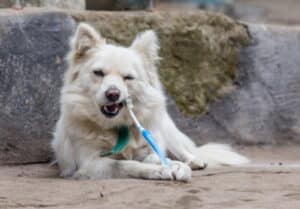 Did you know that by three years old, most cats and dogs will have at least some degree of dental disease? Swollen gums, bad breath, and stained teeth are all signs that your pet might have some oral health problems.
Did you know that by three years old, most cats and dogs will have at least some degree of dental disease? Swollen gums, bad breath, and stained teeth are all signs that your pet might have some oral health problems.
The earlier you detect dental disease, the healthier your furry companion will be. So, it’s essential to learn more about veterinary dentistry and how it can improve your pet’s oral health. Doing this will allow you to establish a healthy routine for your pet.
Keep reading this guide to learn everything you need to know about veterinary dentistry!
What Is Veterinary Dentistry?
Our pets need dental care to live long and healthy lives. Veterinary dentistry involves assessing, diagnosing, and treating various dental problems in dogs and cats. Veterinary dentistry covers a range of services that include:
- Tooth extractions
- Dental cleanings
- X-rays
- Correction of bite problems
- Reconstructive surgery
- Periodontal surgery
- Removal of masses
Your vet will also talk to you about the dental care you can do at home to prevent dental disease.
Why Is Veterinary Dentistry Important?
Like humans, our pets can develop a dental disease known as periodontal disease. Periodontal disease causes inflammation of the gums. Sometimes you’ll see it manifest as a tooth abscess or infection of the jawbone.
When pets develop periodontal disease, the bacteria can enter the bloodstream and travel around the body. The bacteria can cause inflammation of the heart’s inner lining, known as endocarditis.
Other organs that are affected by dental disease include the liver and kidneys. Inflammation and infection from bacteria in the mouth can cause infections with weight loss, fever, and decreased appetite.
Benefits of Veterinary Dentistry
Routine dental cleanings will have a positive impact on your pet’s health. Keep in mind as your pet ages, they’re more likely to have dental problems like tooth decay or gum disease.
Dental exams and cleanings can reduce the amount of plaque buildup. As a result, they reduce the risk of tooth decay, gum disease, and infection. Dental exams also catch dental problems early before they can cause any significant health problems.
If a pet has dental issues, it might have difficulty eating normally. Therefore, regular cleanings also help to keep your pet’s nutrition where it needs to be.
When Should Your Pet Have Dental Treatment?
Remember, veterinary dentistry isn’t just for emergencies. Routine exams and cleanings are sometimes only necessary once or twice a year. The frequency of cleanings depends on factors like your pet’s overall diet and dental health.
Additionally, some small breed dogs like Chihuahuas and Yorkshire Terriers tend to be more susceptible to dental disease. Dogs with a flatter face structure, such as Boxers or Bulldogs, may also be more prone to dental disease.
So, talking to an experienced veterinarian about how often you should schedule exams and cleanings throughout the year is essential.
However, you should make an appointment immediately if you notice symptoms such as:
- Weight loss
- Dropping food out of the mouth when eating
- Loose teeth
- Bad breath
- Red or bleeding gums
- Mouth sensitivity
- Extra teeth
- Discolored teeth
- Obvious infection
What Happens During a Dental Cleaning?
When your cat or dog comes in for a dental cleaning, they will naturally feel anxious. Your veterinarian will administer anesthesia to ensure your pet is relaxed and safe during the procedure.
Your pet will be monitored throughout the entire procedure. Your pet will get an examination of its mouth and teeth to assess its overall oral health. Typically X-rays will be taken to evaluate the bone structure and to look for any signs of disease.
Next, your veterinarian will clean each tooth thoroughly. To accomplish this, your vet will use a technique known as ultrasonic scaling.
Ultrasonic scaling essentially vibrates the tarter off the teeth and doesn’t cause any trauma to the tooth enamel. It’s a safe and effective process that allows your pet’s teeth to be cleaned quickly, so it reduces time under anesthesia.
Your vet will check under the gums to look for any signs of gum disease and will use antibiotics if they find any problems.
Finally, your vet will perform tooth extractions if they detect loose, cracked, or infected teeth that they can’t save.
What Dental Care Should I Do at Home?
You can also take steps at home to improve your pet’s oral health. Whether you have a cat or dog, your first step to dental care at home is daily brushing with an enzymatic pet toothpaste.
Brushing your pet’s teeth for the first time can be frustrating, so start slowly. It’s important to be patient with your pet and yourself. Simply do your best each day until your pet becomes accustomed to this routine.
Another excellent option for home dental care is an oral rinse. Oral rinses for pets typically contain chlorhexidine, vitamin C, and zinc gluconate. You can use them along with brushing or in place of brushing if you find brushing too challenging to manage.
You can typically find pet oral rinses online or at pet health retail stores. Talking to your vet about where to find this product is best.
Finally, you can make changes to your pet’s food. Certain types of pet food and chews are specially designed to reduce tartar buildup. These foods are also nutritionally balanced and have a good taste. There are many brands to choose from, like Purina Dental Diet, so ask your vet for a recommendation.
Book a Veterinary Dentistry Appointment Today
Now that you know more about veterinary dentistry and why it’s so important, you can book an appointment for your furry friend today.
If you’re looking for an experienced veterinarian in Charleston, SC, you can take your pet to Hampton Park Veterinary for all its pet dental care needs. We also offer a variety of services like geriatric pet care, emergency pet care, pet dermatology, and veterinary surgery.
We will customize our treatments to meet your pet’s needs and ensure you feel comfortable. Reach out and schedule an appointment.

